Here are several key takeaways when it comes to Americans’ opinions of NATO:
- Americans continue to hold a largely favorable view of NATO, with a majority expressing a positive opinion of the alliance. However, ratings have dipped slightly over the past year, driven largely by declining favorability among Republicans and Republican-leaning independents.
- About two-thirds of U.S. adults see a benefit to NATO membership, but fewer say this today than in 2022. This change has also largely occurred among Republicans.
- The share of Americans who believe the alliance’s influence is getting stronger dropped 11 percentage points over the past two years, with similar declines among both Democrats and Republicans.
- Those who have more knowledge of NATO are more inclined to see the organization favorably.
Views of NATO
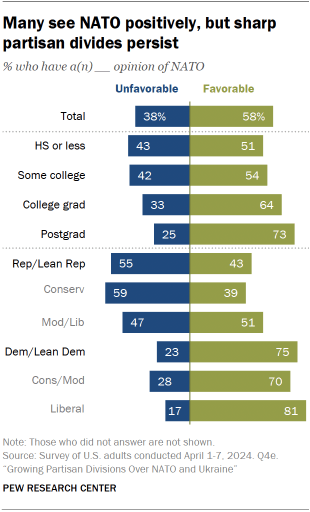
While a majority of Americans (58%) have a favorable opinion of NATO, positive views of the alliance dropped 4 points – a statistically significant decline – since this question was last asked in 2023.
The well-established partisan divide on views of NATO has grown wider in 2024. Republicans have become less favorable of the alliance over the past year: 43% have a positive view of NATO, down from 49% who said the same in 2023. Meanwhile, Democrats and Democratic-leaning independents remain positive about NATO into 2024: Three-quarters of this group see the alliance in a favorable light (comparable to 76% in 2023).
Those with at least a four-year college degree are more likely than those with less education to express a positive opinion of NATO, though those with less education are slightly less likely overall to offer an opinion.
Americans who say security and defense ties are important for strong relations between the U.S. and Europe are almost twice as likely to have a favorable view of NATO when compared with those who do not consider security ties to be important (60% vs. 33%).
Views of U.S. support for Ukraine are also linked to opinions about NATO. About eight-in-ten U.S. adults (82%) who believe the U.S. is not providing enough support to Ukraine have a favorable opinion of NATO, compared with 34% favorability among those who say the U.S. is providing too much support.
U.S. membership in NATO
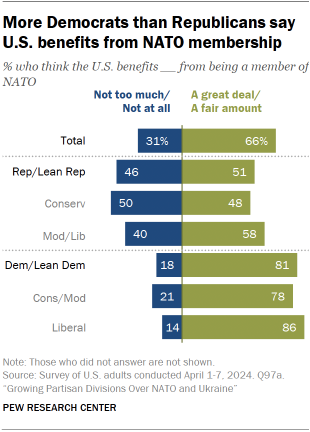
About two-thirds of Americans (66%) say membership in NATO benefits the U.S., compared with 31% who believe it does not. The share who see a benefit has dropped slightly, from 69% in 2022.
Of the three multilateral organizations asked about in the survey (NATO, the United Nations and the World Health Organization), the U.S. public sees NATO membership as most beneficial. In comparison, 60% say UN membership benefits the country, and 58% say the same about WHO membership.
Related: Fewer Americans view the United Nations favorably than in 2023
The partisan divide seen in overall views NATO is present here as well: 81% of Democrats say the U.S. benefits from being a member of NATO, while 51% of Republican say the same. Liberal Democrats are more likely than any other ideological group to see a benefit to NATO membership.
Additionally, those who think shared security and defense ties are important for strong relations between the U.S. and Europe are much more likely to believe the U.S. benefits from NATO membership than those who do not think these ties are important.
NATO’s influence in the world
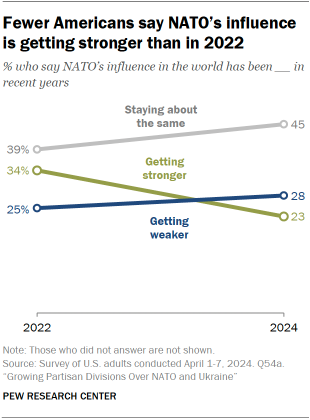
The share in the U.S. who see NATO’s influence in the world as getting stronger declined 11 percentage points since this question was last asked in May 2022, after Russia’s invasion of Ukraine. Only 23% of Americans believe NATO’s influence is getting stronger. Meanwhile, 45% say its influence is staying about the same, up from 39% in 2022. And 28% believe the alliance is getting weaker, a slight increase from the 25% who said the same two years ago.
Democrats have been consistently more likely than Republicans to say NATO’s influence in the world is getting stronger.
Americans’ knowledge of NATO
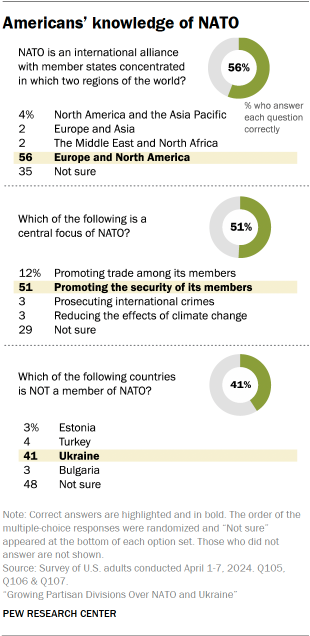
Americans have a varying level of knowledge about where NATO members are located, the organization’s central focus and Ukraine’s nonmember status. A majority (56%) can correctly identify Europe and North America as the two regions from which the alliance draws membership. And about half (51%) recognize promoting the security of its members as a central tenet of the alliance. Fewer (41%) are able to correctly identify Ukraine as a nation that is not a member of NATO.
Overall, 30% of Americans answered all three NATO knowledge questions correctly. About a fifth each answered two correctly (19%) or one correctly (20%). And 31% of U.S. adults did not answer any question correctly (including the share who chose “Not sure” at least once alongside incorrect answers).
Americans ages 65 and older are 20 percentage points more likely than those ages 18 to 29 to answer all three NATO knowledge questions correctly (38% vs. 18%). Previous Center research has found that older adults tend to have more knowledge of international affairs than their younger counterparts.
Americans with more education are more likely than those with less to answer all three questions correctly: Half of those with a postgraduate education gave three correct answers, compared with 17% of those with a high school education or less.
Notably, Democrats and Republicans were equally likely to answer all three questions correctly.
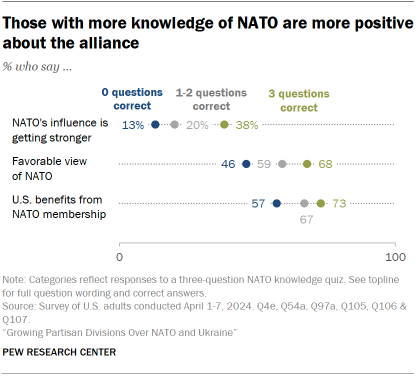
People who knew more about NATO tended to have different views of the alliance than those who did not know as much about it. For example, 73% of those who answered all three quiz questions correctly believe the U.S. benefits from NATO membership, compared with 57% of those who answered no questions correctly.
Additionally, a higher share of those who gave three correct answers have a favorable view of NATO (68%), compared with 46% of those who gave no correct answers. Respondents with a higher level of NATO knowledge are also more likely to say the organization’s influence is on the rise.




